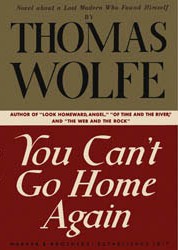Who Says She Cant Come Home Again Song Song
 First edition encompass | |
| Editor | Edward Aswell (edited and compiled piece of work from writings of Wolfe, published posthumously)[1] |
|---|---|
| Author | Thomas Wolfe |
| Genre | Autobiographical fiction, Romance |
| Published | New York, London, Harper & Row, 1940 |
| Pages | 743 |
| OCLC | 964311 |
You Can't Go Home Over again is a novel past Thomas Wolfe published posthumously in 1940, extracted by his editor, Edward Aswell, from the contents of his vast unpublished manuscript The October Fair. Information technology is a sequel to The Web and the Rock, which, forth with the collection The Hills Beyond, was extracted from the aforementioned manuscript.
The novel tells the story of George Webber, a fledgling writer, who writes a book that makes frequent references to his habitation town of Libya Hill which was really Asheville, Due north Carolina. The book is a national success merely the residents of the town had been unhappy with what they view as Webber's distorted depiction of them, send the author menacing letters and death threats.[2] [iii]
Wolfe, as in many of his other novels, explores the changing American society of the 1920s/30s, including the stock market crash, the illusion of prosperity, and the unfair passing of time which prevents Webber e'er beingness able to render "domicile again". In parallel to Wolfe's relationship with the Us, the novel details his disillusionment with Germany during the ascension of Nazism.[four] [5] Wolfe scholar Jon Dawson argues that the two themes are connected about firmly by Wolfe's critique of capitalism and comparing between the rising of capitalist enterprise in the United States in the 1920s and the rise of fascism in Federal republic of germany during the same flow.[6]
The artist Alexander Calder appears, fictionalized equally "Piggy Logan".[7]
Plot summary [edit]
George Webber has written a successful novel about his family and hometown. When he returns to that town, he is shaken by the force of outrage and hatred that greets him. Family and lifelong friends experience naked and exposed by what they have seen in his books, and their fury drives him from his home.
Outcast, George Webber begins a search for his ain identity. It takes him to New York and a hectic social whirl; to Paris with an uninhibited group of expatriates; to Berlin, lying common cold and sinister nether Hitler's shadow. The journeying comes total circumvolve when Webber returns to America and rediscovers it with beloved, sorrow, and promise.
Championship [edit]
Wolfe took the championship from a conversation with the author Ella Winter, who remarked to Wolfe: "Don't y'all know you can't go dwelling house over again?" Wolfe then asked Wintertime for permission to utilize the phrase every bit the title of his book.[8] [9]
The championship is reinforced in the denouement of the novel in which Webber realizes: "You tin can't go dorsum home to your family, back home to your childhood ... back domicile to a fellow's dreams of glory and of fame ... back home to places in the country, dorsum home to the sometime forms and systems of things which once seemed everlasting, simply which are changing all the time – back home to the escapes of Time and Memory." (Ellipses in original)[10]
References [edit]
- ^ You Can't Go Home Again. OCLC Worldcat. OCLC 964311.
- ^ "You Tin't Go Home Once again". Magill Volume Reviews. 15 March 1990.
- ^ Strauss, Albrecht B. (Spring 1995). "You Tin't Go Dwelling house Over again – Thomas Wolfe and I". Southern Literary Periodical. 27 (2): 107–116.
- ^ Godwin, Rebecca (2009). "'You Tin can't Go Dwelling house Over again': Does Nazism Really Transform Wolfe's Romanticism?". Thomas Wolfe Review. 33 (1/two): 24–31.
- ^ Hovis, George (2009). "Beyond the Lost Generation: The Expiry of Egotism in 'You Can't Go Habitation Again.'". Thomas Wolfe Review. 33 (ii): 32–47.
- ^ Dawson, John (2009). "Await Outward, Thomas: Social Criticism equally Unifying Element in 'You lot Tin can't Go Habitation Again.'". Thomas Wolfe Review. 33 (1/ii): 48–66.
- ^ Shattuck, Kathryn (October 10, 2008). "From a Big Imagination, a Tiny Circus". The New York Times . Retrieved January xi, 2014.
- ^ Fred R. Shapiro, ed. (2006). The Yale Volume of Quotations. New Haven, Connecticut: Yale University Press. p. 832. ISBN978-0-300-10798-2.
- ^ Godwin, Gail (2011). "Introduction". You Tin't Go Home Once again. Simon and Schuster. p. xii. ISBN9781451650488 . Retrieved 2013-03-05 .
- ^ Madden, David (2012). "'You Can't Become Abode Over again': Thomas Wolfe's Vision of America". Thomas Wolfe Review. 36 (1/ii): 116–126.
External links [edit]
- You Can't Go Home Once again at Faded Folio (Canada)
- Transcript of interview with Susan J. Matt, To The Best Of Our Cognition radio
Source: https://en.wikipedia.org/wiki/You_Can%27t_Go_Home_Again